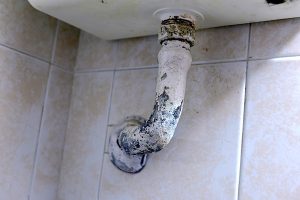Fayette County Commissioner Allen McCarty says he has a solution that will avoid imposing a new stormwater fee on residents in unincorporated Fayette County.
The $18 million in stormwater projects can be funded with money from the county’s 2003 transportation sales tax, McCarty said at last week’s commission meeting. County staff previously has told the commission such is not possible because the stormwater projects don’t match up with the county’s SPLOST road projects.
Georgia law appears to support McCarty’s plan at least in concept, as code section 48-8-121 states that culvert repair “and other repairs necessary for the preservation of roads, streets, bridges, sidewalks and bicycle paths” are acceptable funding uses for sales taxes generated for road, street and bridge improvements.
County staff have urged the commission instead to create a new stormwater utility, which largely will be undertaking replacement and repair of miles upon miles of storm drainpipes that run underneath roads in the unincorporated county.
Creating a stormwater utility will result in a new bill for unincorporated residents, and as proposed last month by county staff the bill would be about $50 a year on the average size home. Last month the commission remanded the matter back to county staff for more answers before a vote is taken on the utility proposal.
The county has previously funded its stormwater improvement projects from the general fund.
“I am totally against stormwater fees or anything else that takes money out of citizens’ pockets, whether it’s a tax or a fee,” McCarty said.
McCarty said the $18 million estimate of needed stormwater funding could be moved to the road department so the stormpipes under roads can be replaced as necessary.
The proposed stormwater fee would be based on the total size of impervious surface for a given lot, but unlike taxes it would be assessed on churches and schools in addition to businesses and homeowners, officials said.
The utility would include a three-person maintenance crew in addition to capital plans to replace old and failing drain pipes.
Asked which transportation sales tax project he would prefer to take the money from to fund stormwater work, McCarty replied: “The West Fayetteville Bypass.”
McCarty has been an outspoken critic of the west bypass, joined by his fellow commissioner Steve Brown. But they have been unable to sway a third commissioner to halt the bypass project, as construction continues with McCarty and Brown being outvoted 3-2 on all bypass matters.
Brown said last week that he agreed with McCarty’s assessment that the funds from the 2003 transportation sales tax could indeed be used for the stormwater improvements.
“You can in fact include stormwater projects within that road SPLOST under the premise of maintaining roads and resurfacing roads,” Brown said.
Also at Thursday’s meeting, county resident Dennis Chase took the commission to task over the proposed stormwater utility and fee.
“A lot of us out there have zero impact on stormwater here in Fayette County,” Chase said. “My property, 100 percent drains into Horton Creek. Not one drop passes any structure under consideration, yet the county wants to charge me $50 or $70 a year and I have no impact, nothing.”
Chase estimated there are about 350 property owners in the county who are in the same predicament as him: facing a potential stormwater fee even though their properties do not usher rainwater into the county’s stormwater collection system.
Chase also was critical of the stormwater utility process, which included a committee of citizens tasked with making recommendations to the commission. Chase claimed that the committee never took any votes, yet was noted by staff to have agreed via consensus instead.
The committee had no information about project costs nor the priority listing of projects, Chase added. Nor did the committee have any onsite visits at certain projects areas, Chase noted.










Leave a Comment
You must be logged in to post a comment.